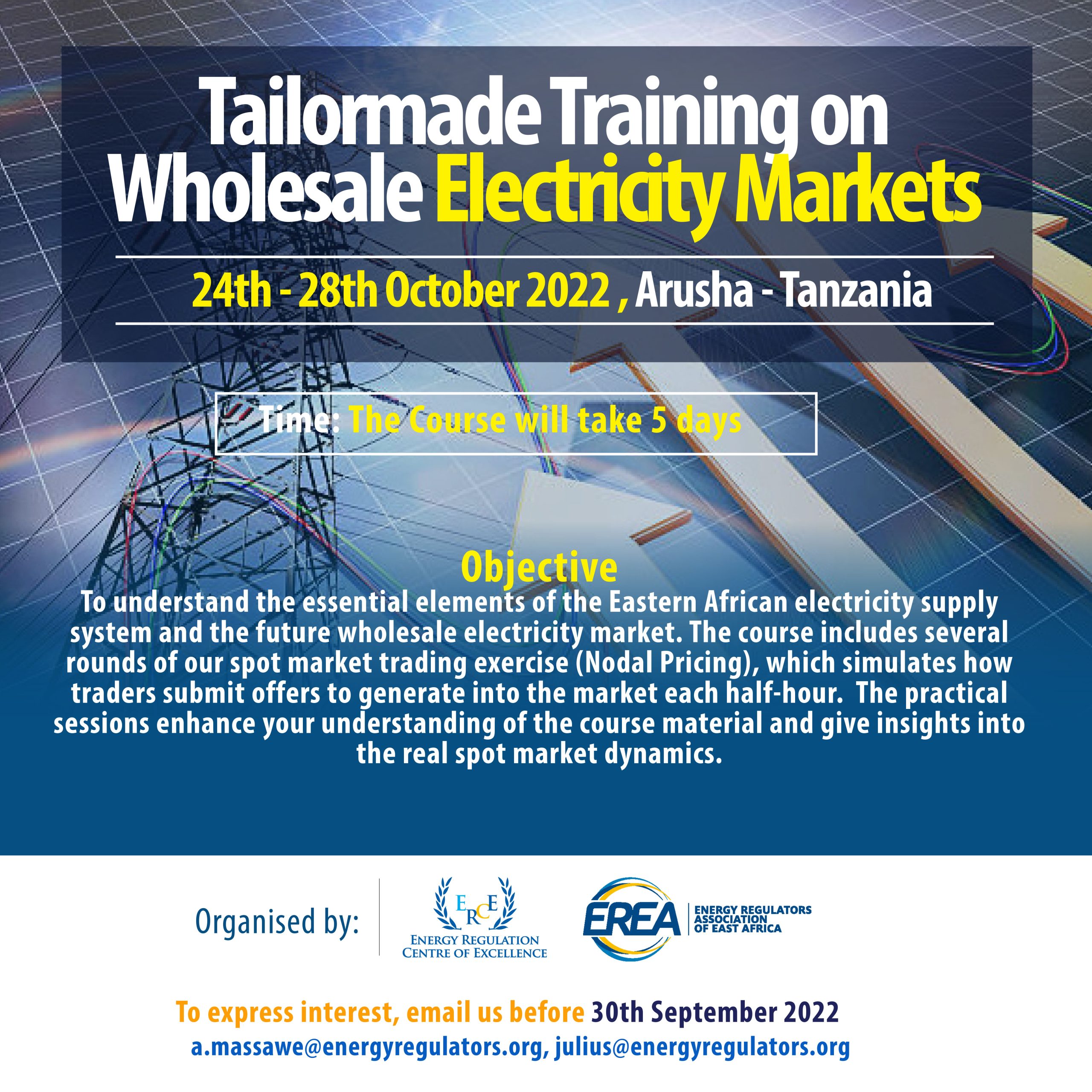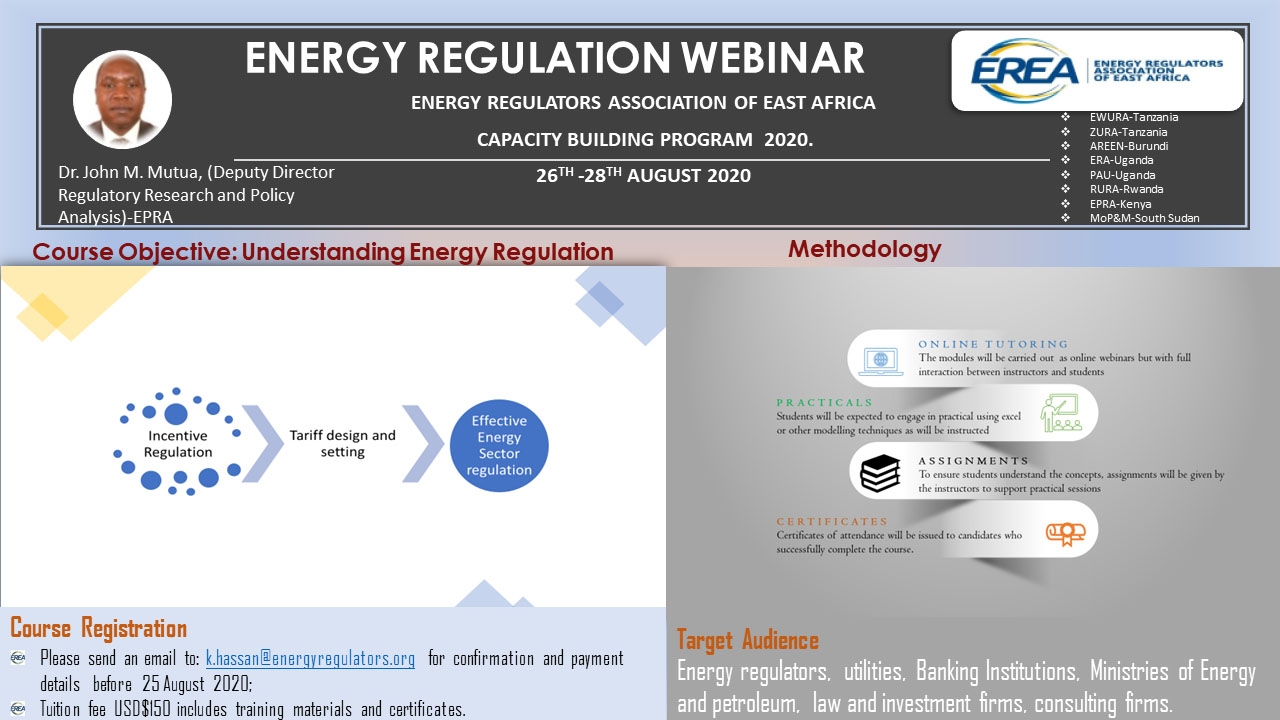Wholesale Electricity Markets
$1,000.00
Tailormade Training on Wholesale Electricity Markets
24th October-28th October 2022 in – Arusha
Introduction
The wholesale market begins with generators, which, after securing the necessary approval, connect to the grid and generate electricity. The electricity produced by generators is bought by an entity that will often, in turn, resell that power to meet end-user demand. These resale entities will generally buy electricity through markets or contracts between individual buyers or sellers. In some cases, utilities may own generation and sell directly to end-user customers.
Learn about traditional and evolved wholesale electricity markets. Utilities in traditional markets are frequently vertically integrated – they own the Generation, transmission and distribution systems used to serve electricity consumers. Wholesale physical power trade typically occurs through bilateral transactions, and while the industry had historically traded electricity through bilateral transactions and power pool agreements.
Objective
To understand the essential elements of the Eastern African electricity supply system and the future wholesale electricity market. The course includes several rounds of our spot market trading exercise(Nodal Pricing), which simulates how traders submit offers to generate into the market each half-hour. The practical sessions enhance your understanding of the course material and give insights into the real spot market dynamics.
The aim of the course is:
- to understand the fundamental microeconomic principles underpinning electricity markets;
- Understand the basics of Power Systems and the Theory of Wholesale Electricity Markets
- Understanding security-constrained economic dispatch
- to discuss different wholesale electricity market models adopted by various countries;
- to discuss the role of scarcity pricing and capacity mechanisms and efficient design rules for balancing and reserves;
- Locational marginal price (LMP) and its components
- Review of supply and demand relationship, spot versus bilateral electricity markets
- Economic merit order selection and unit commitment including responsibilities and obligations
- Security constrained economic dispatch and scheduling
- Two settlement systems: day ahead and real-time settlement
- Cost of transmission congestion
- Financial transmission rights (FTRs) for hedging against transmission congestion
- Wholesale demand response
- Capacity market
- Ancillary services market
- Virtual trading
- to review the challenges associated with the evolution of the part of TSOs and DSOs;
- to discuss the potential for market power and present measures to mitigate market power;
- to explain the long-term investment incentives, the impact of regulatory interventions on these incentives, and the critical elements of a sustainable market framework to support investment for the energy transition;
- Discuss the tension between the theory underpinning energy markets and the concrete implementation issues in practice that regulators face (i.e. the “political economy” of power sector liberalization).
- Regional Wholesale Electricity Markets Fundamentals
Mode
- The lectures provide a foundation on the fundamental drivers of wholesale electricity markets and their associated institutional arrangements. For each topic, the context, economic principles, legal frameworks, and data are explained through discussions of journal articles, scholarly books, official documents of government or international agencies, or empirical reports. Our approach pedagogically maps to key elements of the methodologies of economics (i.e. history, theory, and statistics) and jurisprudential science. It also communicates the tentative nature of scientific knowledge organically advanced, as it were, through repeated confrontations between theory and evidence.
- The laboratory sessions offer opportunities for the hands-on application of numerical and textual analytical tools (e.g. the calculation of energy market equilibria, the estimation of the shadow value of generation capacity, the control of linguistic risks in drafting legislation, regulation, or contracts, etc.). We plan to make use of two widely available pieces of software, Word and Excel, both of which are likely available in the computers of participants. The process of learning the analytical tools in laboratory sessions provides multiple opportunities to engage in group work, review the relevant theory or empirical evidence, collect energy-related information or data, or systematically assess the economics and legal implications for the electricity sector.
Time
The Course will take 5 days
Cost
The training cost will be US$1000 per person covering the materials, meals and cost of the venue.
 erce
erce




